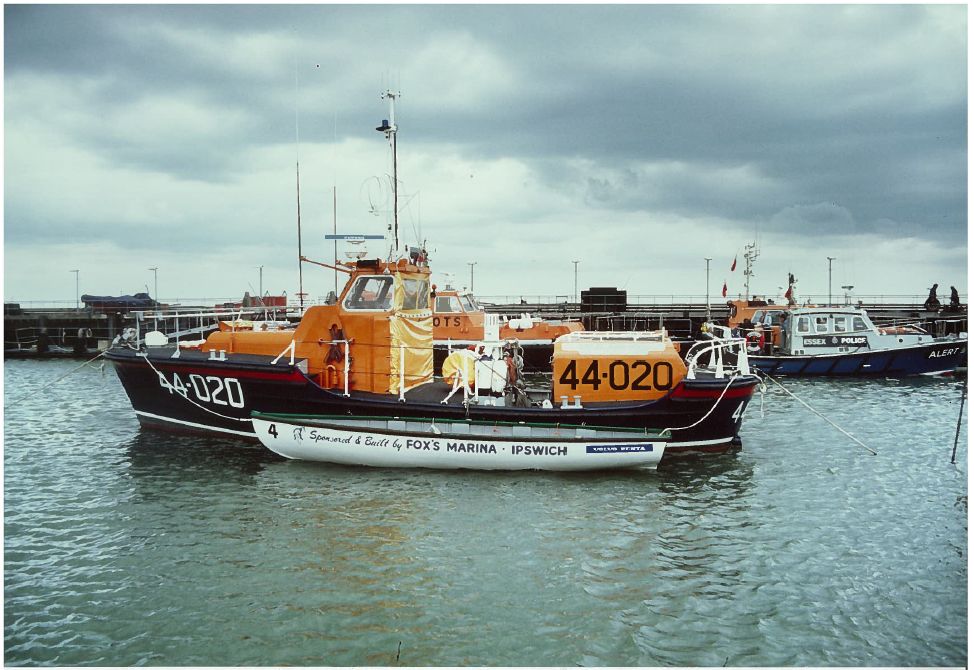The Claydon Skiffs are 22 feet long, fixed seat traditional rowing boats, crewed by four rowers each with a single “sweep” oar, and with a Cox to steer. Built of GRP they were designed to weigh in at around 400 kilos without their equipment and crews. They are broad and stable in heavy water, but also heavy to row, heavy horses rather than race horses but none the worse for that.
The boats are based on original oak clinker built watermen’s skiffs designed for working on the tidal reaches of the Thames. Races evolved later and the 1846 Gravesend Regatta featured a prestigious race for apprentices of the Waterman’s Company (The Worshipful Company of Watermen and Lightermen est. 1555) in which the first prize was a fully equipped waterman’s boat, designed to set the winner up in business. Pre-second world war, races included the Long Ferry Race from Westminster to Gravesend which celebrated the fact that until the end of the 18th century the journey was quicker by boat than by road. After the Second World War six new traditional boats were built at Gravesend with money raised by the Town Regatta Committee and these were regularly raced until the 1970’s.
The wooden boats were difficult to maintain, and outlived the craftsmen who built and maintained them. They were gradually replaced by the Claydon Class GRP Skiffs that we have today, based on a mould taken from one of the traditional clinker built examples. A few of the traditional Oak Gravesend Skiffs still exist and Percy Sargeant took part in the Great River Race in 2013 with a handicap of 23, one of the first boats away. The Claydon skiffs are only a little lighter than the originals and have a handicap of 27 (leaving four minutes later).
In the 1980’s racing continued at Gravesend, with the boats rowed largely by crews from the tug companies and it was this connection that brought the Claydon Skiffs to Felixstowe and Harwich in the early 1990’s. In 1989 a crew from Alexandra Towing Co. (Felixstowe) first took part in the Shrimpers’ Regatta in Gravesend, rowing borrowed local Gravesend Claydon Skiffs. They were roundly beaten by Alexandra Towing Co. (Gravesend). The rivalry continued and in 1990 the crews of the Alexandra Towing Co (Felixstowe) organised a regatta on the river Orwell using five boats borrowed from Gravesend. Participants included Felix Ark Marine ltd, Felixstowe Dock and Railway Co. Firemen, Ipswich Dock Workers and Harwich Port Workers. They raced over a four and a half mile course ending at the Orwell Bridge, with a further race of seven and a half miles down the Orwell to Felixstowe. The local press reported that the event was watched by a crowd of three hundred people and that Felixstowe beat Gravesend in all of the races. The Felixstowe crew went on that year to win the two Tugmen’s cups at the Shrimpers’ Regatta at Gravesend and came third in both the Long Ferry Race and the Great River Race.
At this point the Felixstowe crews decided that transporting boats from Gravesend to Suffolk was too expensive and it was time for Felixstowe to have their own Claydon Skiffs. They purchased the original mould (apparently found languishing in a field) and set about a building programme. In 1990, the first three “Felixstowe” Claydon Skiffs were built, two for Alexandra and the third for Felix Arc Marine. In December 1990 a meeting was held at the Drunken Docker’s Club in Ipswich to get together people interested in forming clubs or associations to own their own boats to establish the Alexandra Tug Company Rowing Club (ATRC) with the aim being “to provide boats at as low a cost as possible, assist in crew training, and to revive old skills in these replica rowing boats on local rivers”.
A press cutting from the East Anglian Daily Times, May 29, 1991 reports the launch of the £3.2m Tug ‘Trimley’ for the Alexandra Towing Company Felixstowe, along with a fleet of five Claydon Skiffs, launched and dedicated by Alexandra and Felixarc companies at Felixstowe, and the Harwich Haven Authority. The Boats were all named after local people and were intended to race to raise money for local charities including the RNLI. The picture above shows the new Tug with the Harwich Haven Authority boat ‘Viscon’ named for the Chief Executive Captain Victor Sutton and given the number 4. A Claydon Skiff bearing the number 4 is now at Titchmarsh Marina, going by the name of ‘Christopher Jones’.The ATRC organised races locally and a programme for 1991 included a number of events including the River Orwell Tugmans’ Regatta for which a Thames Pleasure Boat was hired for up to 200 spectators. Also included was a Two Rivers Race from Mistley to Ipswich (14 miles).
Sadly, it seems that the Tug Companies did not survive as long as the Claydon Skiffs, and although some boats were also raced by Pub Crews and Social Clubs, the number of known boats is relatively small. It is difficult to know the exact number of boats, as many of the names change as they move into new ownership and their numbers are also not retained. However, Claydon Skiffs still have their own category in the Great River Race with one of the grandest trophies in the competition, and around 17 different boat names appear in the entries for the Claydon Skiff class in the Great River Race over the past few years.

